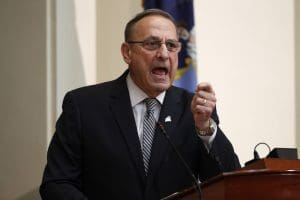Former Maine governor who called nonwhite people 'the enemy' wants his job back
Paul LePage’s tenure was marked with racist comments, attacks on his critics, and refusals to do his job.

Former Maine Gov. Paul LePage said Wednesday that he will move back to the state and run for his old job. LePage, who no longer lives in Maine, had previously promised that he was finished with politics.
The Republican, who served two terms as governor, said he would run against his successor, Democratic Gov. Janet Mills, in 2022. “Believe me, I will challenge her,” he told right-wing radio host Howie Carr.
“Yes, I am going to challenge Janet Mills in 2022 because the state will be worse off than it was when I took over in 2010 and I do believe I have the skill set to fix it,” LePage said.
LePage bolted the state after leaving office in January 2019. “I’m going to retire and go to Florida. I’m done with politics. I’ve done my eight years. It’s time for somebody else,” he said at the time. As of this January, he was registered to vote in Flagler County, Florida.
“I’m flying home next Saturday and I will become a resident of Maine, not to leave anymore,” he told Carr.
LePage’s tenure in office was marked by a series of threats, racist comments, and refusals to do his job.
- He told NAACP leaders in 2011 to “kiss my butt” after they questioned his decision not to attend Martin Luther King Jr. Day events.
- He was reported to have said in 2013 that Barack Obama “hates white people.”
- He said in 2016 that “guys with the name D-Money, Smoothie, Shifty” come to Maine from other states to sell heroin and “half the time they impregnate a young, white girl before they leave.”
- He said that he was compiling a binder of drug arrests and that “90-plus per cent of those pictures in my book, and it’s a three-ringed binder, are black and Hispanic people.”
- He left a voicemail for a state lawmaker who criticized his racist remarks, calling him a “son of a bitch, socialist cocksucker.” He later said that he would like to fight the lawmaker in a duel and that he would aim for his head.
- He embraced racial profiling, calling black and Hispanic people the “enemy” in Maine’s drug war. “When you go to war, if you know the enemy and the enemy dresses in red and you dress in blue, then you shoot at red,” he told reporters.
- He refused to expand Medicaid in Maine, even after voters approved a ballot measure requiring expansion and a court ordered him to implement it. “I will go to jail before I put the state in red ink,” he said in 2018, suggesting the program would be too costly. “And if the court tells me I have to do it, then we’re going to be going to jail.” Mills used her first executive order the day after she was sworn in as governor to implement the expansion.
In February 2016, LePage said on Carr’s show, “I was Donald Trump before Donald Trump became popular, so I think I should support him since we’re one of the same cloth.”
While LePage now says his “skill set” would fix Maine’s problems, in August 2016 he considered resigning from office following criticism of his profane voicemail. “I think some things I’ve been asked to do are beyond my ability,” he said at the time.
LePage may face an uphill battle to regain the governorship. He narrowly won in 2010 and 2014 and never garnered a popular majority.
A poll conducted in March and released on April 13 found registered Maine voters currently give Mills a 60% approval rating, vastly preferring her pandemic response to Trump’s. Her disapproval rating was just 26%.
Published with permission of The American Independent Foundation.
Recommended

SC governor to sign bill banning hormone therapy for transgender youth into law
Treatments for youth already taking the drugs could be gradually taken off them through Jan. 31
By Skylar Laird, South Carolina Daily Gazette - May 09, 2024
Ohio Gov. DeWine said he didn’t know of millions in FirstEnergy support. Is it plausible?
Ohio Gov. Mike DeWine’s claim to not know about the millions an Akron utility spent supporting his 2018 campaign for governor simply isn’t credible, an Ohio political scientist said in a recent interview. A spokesperson for DeWine pushed back. FirstEnergy provided that support, then spent more than $60 million to pass and protect a $1.3 billion ratepayer-financed […]
By Marty Schladen, Ohio Capital Journal - April 29, 2024
Missouri governor hopeful Bill Eigel rejects affordable childcare proposal
Eigel has previously supported stripping funds from public schools and once opposed an expansion of early kindergarten.
By Jesse Valentine - April 15, 2024












































































